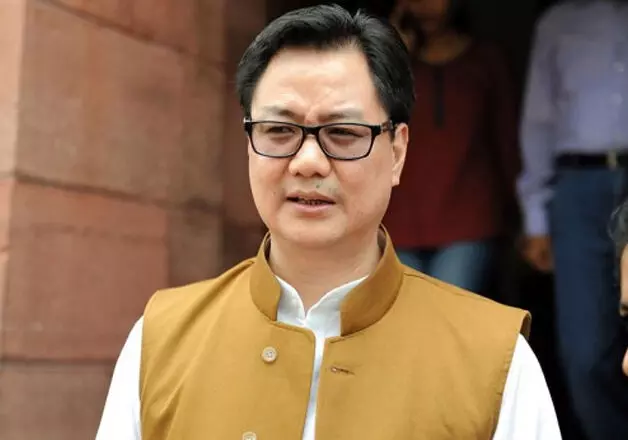Want govt representatives in SC Collegium, Law Min writes to CJI

New Delhi: Law minister Kiren Rijiju has written to the Chief Justice of India D Y Chandrachud for the inclusion of government nominees in the collegium system on appointments to the higher judiciary and defended it as a “precise follow-up action” suggested by the apex court while striking down the NJAC Act.
Rijiju’s early January letter to the CJI and the remarks on Monday come amid a tug-of-war between the government and the judiciary over the process of appointments of judges to the Supreme Court and high courts.
At present, the collegium comprises CJI Chandrachud, and Justices S K Kaul, K M Joseph, M R Shah, Ajay Rastogi and Sanjiv Khanna.
As the back and forth between the apex court and Law ministry prolongs, the NJAC Act has been at the centre of discussions. Passed by Parliament and quashed by the Supreme Court in 2015, the Act had envisioned two-government representatives in the body that will appoint judges.
Besides several Union ministers, Vice-President Jagdeep Dhankhar has slammed the 2015 scrapping of the National Judicial Appointment Commission (NJAC) by the apex court and claimed that the judiciary was encroaching on the domain of the legislature.
The Opposition, however, hit out at the move, with Congress leader Jairam Ramesh saying that while reforms were needed, the government’s remedy was a “poison pill” for the independent judiciary. It also alleged that it was an “orchestrated confrontation” by the government to “capture” the judiciary.
Officials said the Law minister has sought the setting up of a “search and evaluation committee” with representation from the Central and the state governments in the selection of judges for the Supreme Court and the High Courts respectively.
Delhi Chief Minister Arvind Kejriwal dubbed the government’s move as “extremely dangerous”.
“There should be absolutely no government interference in judicial appointments,” Kejriwal said on Twitter.
Reacting to Delhi chief minister’s remarks, Rijiju said the move is in line with the direction of the Constitution Bench to restructure the MoP (Memorandum of Procedure) of the collegium system.
“I hope you honour Court’s direction! This is precise follow-up action of the direction of the Supreme Court Constitution Bench while striking down the National Judicial Appointment Commission Act. The SC Constitution Bench had directed to restructure the MoP (Memorandum of Procedure) of the collegium system,” the minister said on Twitter.
“The contents in the letter to hon’ble CJI are exactly in conformity with the observations and directions of the Supreme Court Constitution Bench. Convenient politics is not advisable, especially in the name of Judiciary. The Constitution of India is supreme and nobody is above it,” Rijiju said.
Congress leader Ramesh alleged that the government was seeking “complete subservience”.
“The V-P’s assaults. The Law Minister’s attacks. All this is orchestrated confrontation with the judiciary to intimidate and thereafter capture it totally. The Collegium needs reform. But what this Govt wants is complete subservience — Its remedy is a poison pill for the judiciary,” Congress leader Ramesh said.
In November, Rijiju had said that the collegium system of making judicial appointments was “alien” to the Constitution.
A parliamentary panel too had expressed surprise that the government and the Supreme Court Collegium have failed to arrive at a consensus on the MoP, guiding the appointment, elevation and transfer of apex court and high court judges, even after almost seven years.
In October 2015, a five-judge Constitution Bench of the Supreme Court declared the NJAC Act, passed unanimously by Parliament, for appointing judges as unconstitutional on several counts.
The bench, headed by the then CJI J S Khehar, asserted: “In the matter of appointment of judges to the higher judiciary, as also in the matter of their transfer, the primacy in the decision-making process inevitably rests with the Chief Justice of India.”
In December 2015, the Supreme Court bench said views of the Centre and states should be taken into account and asked the government to prepare a MoP in consultation with the Chief Justice of India to enable transparency in the collegium system of appointment of judges.
It also asked the Centre to take into consideration suggestions on issues of eligibility, transparency, setting up the Secretariat for the appointment of judges, redressal of complaints and other issues in the MoP on the appointment of judges.
In its report in the last session of Parliament, the department-related Standing Committee on Law and Justice and Personnel said it expects the government and the judiciary to finalise the revised MoP, “which is more efficient and transparent”, in terms of a Supreme Court observation.



